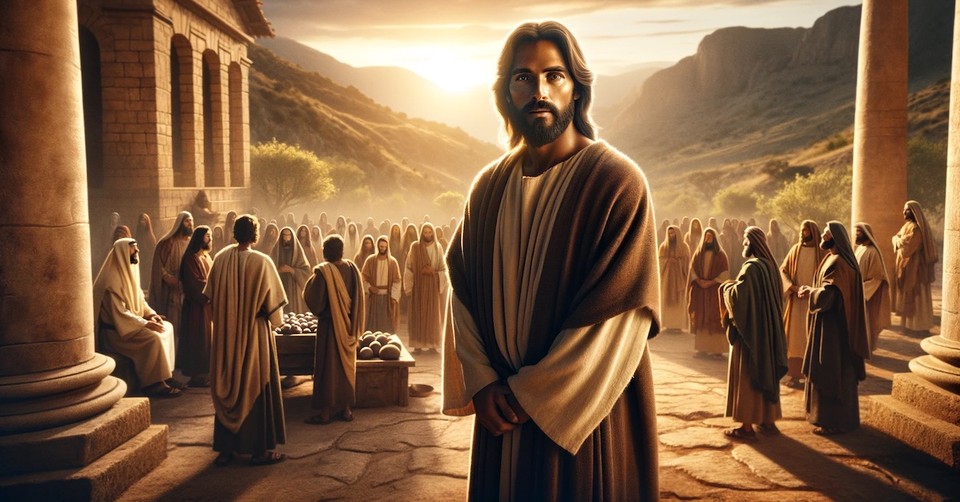It can be a confusing question when asked — Is Jesus God? Are God and Jesus the same person? On one hand, many of us know that God comprises the Holy Trinity: God the Father, God the Son (Jesus), and God the Holy Spirit. The Father is God, Jesus the Son is God, and the Holy Spirit is God, all co-existing as one perfect Almighty and All-Powerful God in a beautiful, synchronous mystery.
We can understand this merged three-in-one concept by looking at the wording of Genesis 1:26, when God said, “Let us make mankind in our image.” The “our” here represents the collective God being, one in nature but comprising three different persons.
But God and Jesus are also separate beings in that Jesus is the Son and God is the Father. As persons of the Trinity, they are separate, yet with the Holy Spirit, they are united and interdependent.
I like to think of the Celtic trinity knot, also called the triquetra, to wrap my mind around this. The triquetra features three pointed ovals, all interlaced and made from one continuous line, said to represent eternity. The central oval points up (representing God the Father), while the other two (representing Jesus and the Holy Spirit) sit on either side of it, pointing down and to the sides. While you can clearly see three distinct elements or points, they are all connected in one constantly flowing line and create one symbol, thereby symbolizing God’s Triune nature.
But if they are part of the same, how are God and Jesus separate? Let’s take a look at what the Bible says about God, Jesus, and their sameness and separateness.
Photo credit: ©Getty Images/boonchai wedmakawand
Is Jesus Really God?
In one sense, God and Jesus are “the same” in that they comprise the Trinity, the Triune God, a three-in-one mystery. In another sense, they are separate entities, three separate co-equal, co-eternal people comprising the one Almighty God. It does get confusing — at times we say “God” meaning the Triune God, and at other times we might say “God” meaning the Father. Jesus is part of God, and the Father is part of God, but Jesus and the Father are not the same people.
Besides the trinity knot, triquetra, another helpful analogy might be thinking of the Triune God as a person comprising body, mind, and spirit. They work together and are “one,” yet sometimes the body works on its own accord. For example, our heart beats on its own without us needing to think about it. Some people use analogies like water to try to explain the trinitarian nature of God, as water can be ice, liquid, and vapor, but most people reject this analogy as flawed because water cannot be all three at once (while God is Father, Son, and Spirit all at the same time).
There might not be a perfect way to explain it in a way that makes sense to the human mind, but we do know Scripture is clear that God comprises all three.
Here are three instances where Jesus indicated His divine nature and His identity as God, along with explanations of what He said and what He meant:
1. John 8:58 - "Before Abraham was, I am."
What He Said: Jesus declared, "Very truly I tell you," Jesus answered, "before Abraham was born, I am!"
What He Meant: In this statement, Jesus uses the phrase "I am," which directly references God's self-identification to Moses in Exodus 3:14 ("I AM WHO I AM"). By saying this, Jesus is claiming eternal existence and identifying Himself with Yahweh, the God of Israel.
2. John 10:30 - "I and the Father are one."
What He Said: Jesus stated, "I and the Father are one."
What He Meant: This declaration asserts the unity and equality between Jesus and God the Father. The Greek word used for "one" (ἕν, hen) implies unity of essence or nature, not just purpose or action.
3. John 14:9 - "Anyone who has seen me has seen the Father."
What He Said: Jesus responded to Philip's request to show them the Father by saying, "Anyone who has seen me has seen the Father. How can you say, 'Show us the Father'?"
What He Meant: Here, Jesus is explaining that He is the visible representation of God the Father. To see Jesus is to see God because Jesus embodies the fullness of God in human form. This statement emphasizes the intimate relationship between Jesus and the Father, and His role as the perfect revelation of God to humanity.
These statements from Jesus clearly indicate His divine identity and relationship with God the Father, affirming His deity and His unique role in revealing God to mankind.
Matthew 3 depicts a vivid visual of the three parts of God coming together as one at Jesus’s baptism, stating, “As soon as Jesus was baptized, he went up out of the water. At that moment heaven was opened, and he saw the Spirit of God descending like a dove and alighting on him. And a voice from heaven said, “This is my Son, whom I love; with him I am well pleased” (Matthew 3:16-17).
Other verses distinctly mention the interworking of the three persons of God as God-Together. For instance, 2 Corinthians 13:14 blesses the reader, stating, “May the grace of the Lord Jesus Christ, and the love of God, and the fellowship of the Holy Spirit be with you all.” And 1 Peter 1:2 bids well wishes to those chosen “according to the foreknowledge of God the Father, through the sanctifying work of the Spirit, to be obedient to Jesus Christ and sprinkled with his blood.”
Photo credit: ©Getty Images/Oleksandr Hurtovyi
What Does the Bible Say about God?
God is described as “the Father” in many places throughout Scripture, and many people think of God as male. Jesus called God his “Father” and referred to God as “He” and “Him” during his time on earth. But in truth, God is the Great I Am and the Almighty, creator of the universe and all that is within it, and is therefore bigger than gender or other human constraints we try to give him. Still, I refer to God as my “father,” for it is helpful to me.
In fact, in Isaiah 66:13, God compares his tender love and care to that of a mother, noting, “As a mother comforts her child, so will I comfort you; and you will be comforted over Jerusalem.” And in Job 38, God compares himself both to a father and a mother, asking, “Does the rain have a father? Who fathers the drops of dew? From whose womb comes the ice? Who gives birth to the frost from the heavens when the waters become hard as stone, when the surface of the deep is frozen?” (Job 38:28-30).
The most important thing the Bible seems to say about God is about his love, his power, his might, and his everlasting nature. Over and over, we have stories about God as master and protector, who not only created this world but had enough care and mercy that he rescued and redeemed his people in various ways, ultimately sending his son, Jesus, as their path to salvation.
In Revelation 21:6, God calls himself “the Alpha and the Omega, the Beginning and the End.”
The Bible also gives us various names for God that describe aspects of his nature: El Shaddai (Lord God Almighty), El Elyon (God Most High), Adonai (Lord, Master), El Roi (God Who Sees Me), Jehovah Rapha (God Who Heals), and many more.
In Psalm 68:5, God is called “a father to the fatherless, a defender of widows.”
Isaiah 40:28 says God is “the everlasting God, the Creator of the ends of the earth.”
James 1:17 refers to God as “the Father of the heavenly lights, who does not change like shifting shadows.”
And in Ephesians 4:6, we’re reminded God is “Father of all, who is over all and through all and in all.”
Photo credit: ©Getty Images/bruev

What Does the Bible Say about Jesus?
Similarly, the Bible has a lot to say about who Jesus is. We know Jesus is the Christ, the promised and long-awaited Messiah, and the Son of God. The Gospel accounts tell how he was born a baby to a virgin mother impregnated by the Holy Spirit. After he grew to adulthood, he taught, healed, and did many miracles before he was arrested and crucified. Three days later, he rose from the dead and taught the apostles for 40 days until he ascended to heaven, promising to come again to judge the living and the dead.
But there are other descriptors in Scripture that help us understand Jesus.
In 1 Timothy 4:10, Jesus is called “the savior of all people” and in 1 Timothy 6:15 the “King of kings and Lord of lords.”
In John 6:35, Jesus calls himself the Bread of Life, noting, “Whoever comes to me will never go hungry, and whoever believes in me will never be thirsty.”
In Isaiah, the prophet calls him “Holy One of Israel” (Isaiah 5:19), “Immanuel,” which means “God with us” (Isaiah 7:14), and “Wonderful Counselor, Mighty God, Everlasting Father, Prince of Peace” (Isaiah 9:6).
In Luke 9:35, God calls Jesus “my Son, whom I have chosen.” Other translations of that verse use “beloved Son” (NKJV).
Ephesians 5:23 calls Jesus the “head of the church,” while Hebrews 4:14 calls him the “great high priest.”
Photo Credit: ©iStock/Getty Images Plus/artplus

What Makes Jesus Separate or Unique from God?
One of the best ways to understand what makes Jesus separate or unique from God comes in the beginning of the Gospel of John. John explains that the Word was in the beginning, both with and of God. But then he says, “The Word became flesh and made his dwelling among us. We have seen his glory, the glory of the one and only Son, who came from the Father, full of grace and truth” (John 1:14).
That sums up the difference — Jesus was born a man and lived among us, flesh and blood.
What Does This Mean for Our Faith?
What this means for our faith is that in Jesus we have a piece of the collective, Triune God that shares something with us: humanity. Jesus is our intermediary with the Father, our high priest, and he is the way to salvation. At the same time, he is our head, and we the church are his body. The Holy Spirit was sent by God to live within us and help us in the absence of our priest, Jesus.
We don’t have to fully understand how this works. But we need to trust that God is, was, and always will be, that God is also our Father and protector, that God sent his Son Jesus to show us the way, and that the Spirit lives in us to help it all come together.
As Hebrews 11:6 reminds us, “And without faith it is impossible to please God, because anyone who comes to him must believe that he exists and that he rewards those who earnestly seek him.”
So whether you pray to Jesus, God, or Holy Spirit, whether you think of God as three separate and distinct people or not, just know: God is the Great I Am (Exodus 3:14). He is three in one, and his way is perfect, true, and right.
Amen.
Photo credit: ©Getty Images/Lidiia Moor
Originally published December 01, 2022.








